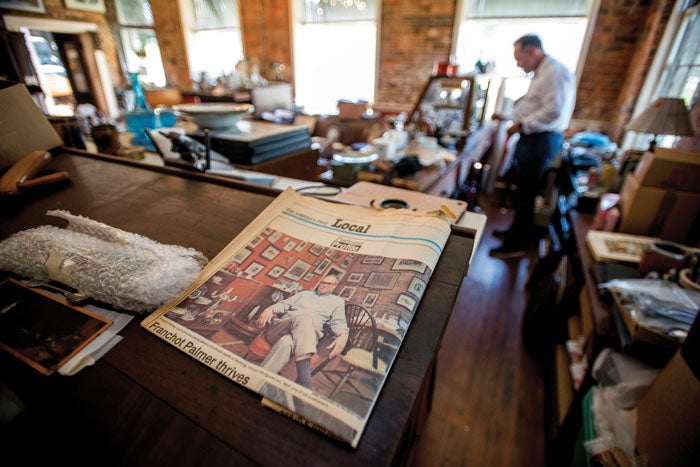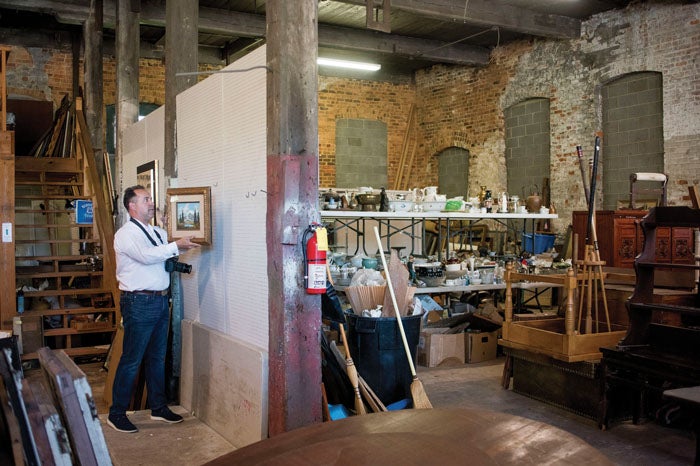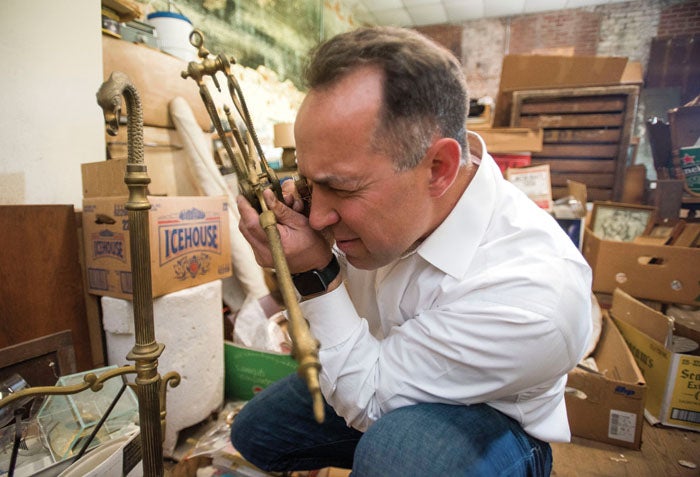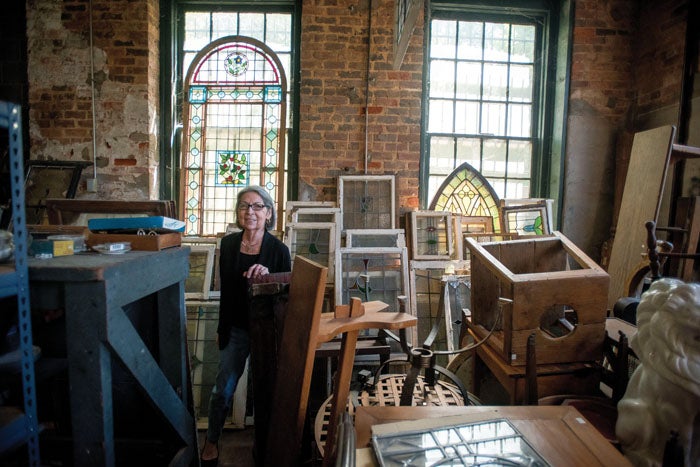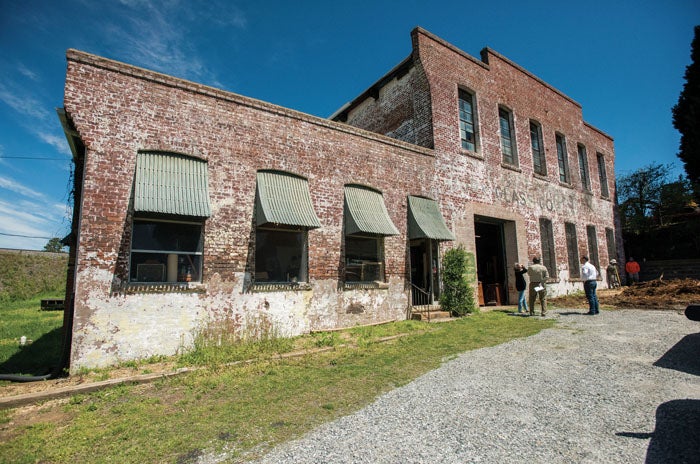Character inside and out: Two-day auction will bring to a close 1839 Antiques shop
Published 12:00 am Sunday, April 21, 2019
SALISBURY — Franchot Palmer’s old store-hours sign next to the front door says Mondays and Thursdays by chance.
And by chance, this was a Monday, and Carol Palmer was inside walking amid the meandering rows and rabbit-warren rooms of antiques — such wonderful things her late husband, Franchot, had collected for their 1839 Antiques shop on West Cemetery Street.
Nearby, auctioneer Chandler Eshleman and his son were photographing items to be cataloged on Eshleman’s website in advance of an auction this Saturday and Sunday.
All this is difficult for Carol, because everything in and about the shop reminds her of Franchot.
“I was just thinking I need to go get some tissues,” she says. “Forty-three years is a long time. Franchot was very passionate about this, and I was, too.”
After Franchot got sick, Carol would drive him to the shop on Saturday afternoons so he could sit in a La-Z-Boy chair and talk to customers about the items they fancied.
It became too cold and drafty by December 2017 — the last time Franchot was able to visit. He died last June.
In the months to follow, Carol took a leave of absence from her job in the development office at Hood Theological Seminary so she could get a better handle on all the inventory in the 6,000 square feet of space.
She kept the shop open on Fridays and Saturdays, and Saturday afternoons were pretty good. Carol was touched by the customers — many of whom were strangers to her — who told her how much they had loved coming to the shop, browsing, chatting and learning from Franchot.
But after last Christmas, and facing a city deadline of vacating by August, Carol says she told herself, “I’ve got to have a plan for phasing this out.”
She closed 1839 Antiques on March 23 to prepare for the auction.
During his sickness, Franchot and Carol talked about her continuing with the shop, possibly in a smaller space elsewhere.
“(But) I don’t have the expertise he had gained over the years,” Carol says. “He was such a history buff, and he loved knowing all the background on things.”
When a visitor makes a first sweep with his eyes, then walks room to room taking in more, the sheer number of antiques Franchot accumulated in this space can be overwhelming.
Carol says her husband almost took the same “five fast pennies” approach to antiques that one-time Food Lion head Ralph Ketner had for groceries. Franchot preferred selling a hundred things at a small profit on each than trying to wait and score a huge sale on one or two items.
So Franchot dealt a lot in what antique folks call “smalls” — affordable pieces that caught his eye. Eshleman says the shop is filled with many of these high-quality items.
Shelves hold ironstone porcelain, glassware, brass, sterling silver, pottery and figurines from many countries. Franchot Palmer also amassed scores of prints, paintings, maps and salvaged architectural elements such as doors, windows and stained glass.
He had an eye, too, for the unusual, especially if the keepsakes had an elegant design. An old lightning rod. Antique tools. An indenture document on sheepskin. Old dental cabinets. A plantation desk. Humidors. Early ballot boxes and key-lock safes.
The shop is filled with good examples of 18th-, 19th- and 20th-century furniture.
Carol especially adores a double clerk’s desk, which looks as though Charles Dickens’ Bob Cratchit should be working over it.
“He was a pretty eclectic antiques dealer,” Eshleman says. “He just had really, really great taste.”
•••
Even though the auction and the general clearing out of things to follow will mark the end of 1839 Antiques on West Cemetery Street, Carol suspects she will keep their space at the Salisbury Emporium.
Franchot, who had refused to become involved in the digital age, never had a presence online. He considered their Salisbury Emporium booth a form of advertisement, directing people to his much bigger shop near the city water plant.
But Carol says people somehow found him through Google searches anyway, plus just word of mouth among customers and dealers.
“So many came in saying they didn’t know where this place was,” Carol says.
Some people would not find this to be the most attractive of buildings or locations.
But it certainly has character, inside and out. The former Littman Mill property, which dates back to 1898, butts up to the city’s water treatment operations.
Up the hill, a water tower looms over the site like a protective giant. The mill building itself sort of hides down a hill off West Cemetery Street, and it’s tucked against a railroad embankment.
“The building shakes a little bit when the train goes by,” says Carol, remembering it reminded her and Franchot of a place they had in Alexandria, Virginia, back in their early days as a couple.
Littman Mill manufactured rope. Some textile operations followed. The building went through other iterations, serving as home for a glass company and an auto body shop, for example.
It features 13 windows on its front facade, and some of its windows in front and on the side sport faded green awnings.
“It’s a great building,” Carol says. “Since I have been here, I’m just amazed at how people have loved this building.”
•••
Just in the past 35 years, this place has gone full circle. The Palmers bought the property from the city in 1985. And about two and a half years ago, they sold it back to the city with the understanding 1839 Antiques would vacate within three years.
The looming August deadline hastened Carol’s plans for the auction.
Back before the Palmers presented their offer in 1985, the city had proposed tearing down the building. Historic Salisbury Foundation became involved and helped save it, with then-Councilman Jim Dunn also an outspoken proponent for its preservation.
It turned out to be a great investment for their business, Carol says. They did a few renovations and even talked seriously at times of building a loft apartment and living there themselves.
“The space upstairs is wonderful,” Carol says, but there’s no elevator, and it was always cumbersome to haul stuff upstairs, if they did at all.
The “1839 Antiques” name actually comes from the 1839 Salisbury Female Academy (which became the Academy and Wrenn House restaurants). The Palmers considered that building for their first antiques shop, but it never worked out.
Instead, they operated out of a small, two-story frame residence on West Bank Street next to the former Star Laundry. The couple dealt in antiques there from 1976 to 1986, and the little house just became too small for the inventory Franchot was accumulating.
Littman Mill offered four times the space.
In buying things for his shop, Franchot Palmer shied away from local auctions and dealt instead with wholesale and high-volume sellers.
He tended to buy things he liked, and in a 1994 story in the Salisbury Post, which Carol still has a copy of, he said he liked to think that when something sold in his shop it was a confirmation of his own taste.
•••
Franchot was an Albemarle native who had undergraduate degrees in both business and insurance from the University of North Carolina.
He served a four-year stint in the Navy and as a young communications officer, Franchot was said to be the first person who received distress signals from an American ship under fire in the Gulf of Tonkin.
That 1965 incident triggered the United States’ full involvement in the Vietnam War.
His love for antiques started with the advice of his stepmother, who urged him to furnish his first apartment back in the States by going to antique shops because he would find better value. He went to work for an insurance company in Washington and spent his free time going to estate sales and antiques stores.
Franchot and Carol met at the insurance office and married in 1973. They returned to Stanly County in 1974 as the health of Franchot’s father worsened.
Though he was invited to return to the insurance business in Washington after his father’s death, Franchot and Carol chose the antiques business instead, when Franchot was 38.
It’s appropriate to say the rest is history, because Franchot loved history and this eccentric, eclectic shop that tried to hide but never could.
Contact Mark Wineka at 704-797-4263 or mark.wineka@salisburypost.com.
A preview of the auction items at 1839 Antiques will be offered after 10 a.m. during the day Friday. The live auction will begin at 9 a.m. Saturday and about noon Sunday on site at 218 W. Cemetery St. Bidding also will be offered online, by telephone and absentee by Chandler’s International Auctions & Estate Sales.


